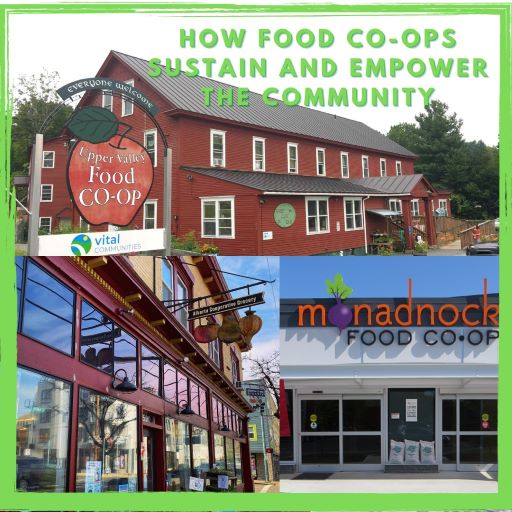
How Food Co-Ops Sustain and Empower the Community
Share
Mainstream supermarkets can be a drain on the environment. Grocery stores can be large contributors to plastic packaging, leaking refrigerant cooling, and food waste. Every grocery store has an environmental impact, some more than others. Think of the aisles of freezers; the shelves full of packaged individual snacks or meals; the lights that stay on all the time; and the flimsy plastic bags that require double-bagging (oh and make sure the eggs and meat each get their OWN bag)!
In the United States, most produce is picked long before it is ripe and shipped an average of 1,500 miles from where it was grown, to its final destination, burning fossil fuels all along the way. Plastic wrapped foods are so common, they’re almost unnoticeable. Supermarkets in the United States use thousands of pounds of refrigerant coolant each year, which contributes to warming the atmosphere. All of these practices are in use in order to preserve food freshness and prolong its life. By buying locally, you’re not only getting food with a smaller carbon footprint, you are also probably getting fresher food that wasn’t harvested while vastly under ripe. Switching from the average American diet to one of all-local ingredients is equivalent to driving 1,000 fewer miles annually.
“Sustainability is a significant part of our mission and ends also. We have invested over $100,000, making our building more energy efficient. The entire span of our roof is the host of the Monadnock Regions’ first locally-owned community-supported solar project. We added 40 new panels to our existing 106-panel array, and NH-based ReVision Energy helped us complete the addition. Our Co-op continues to move towards more compostable packaging, and we are in the process of transitioning containers in our Deli, Bulk, and Produce Departments.”
Megan from Monadnock Food Co-Op, New Hampshire
Food Co-Ops can be the environmentally friendly alternative to a supermarket and more convenient than planning an outing to a Farmer’s market in the dead of winter! Co-ops are without a doubt the best place to find local produce and local products! Bulk foods that customers can scoop into their own containers to take home are often a the big draw of a co-op.
“We have relationships with our local farmers and business owners, and our community knows that we are passionate about giving back to our community. Supporting our local community and sustainability efforts are fundamentally built into our mission and ends. We help our local community in many ways, including our Round it Up monthly donation drives. They allow customers to round their purchase up to the nearest dollar, five or ten at the register, and donate their change to a non-profit that works locals and aligns with our mission. We offer Community Support Donations regularly; this includes contributing food or gift cards to a wide range of community organizations.” Megan from Monadnock Food Co-Op, New Hampshire
“Our customers come to us for the community, the friendliness, and for the specialty products. We focus on products that are organic and local. Almost all of our produce is organic, and that's a big draw for people. We also prioritize vegan, gluten-free, and dairy-free products.”
Larissa from Upper Valley Food Co-Op, Vermont
A co-op is much more than your typical grocery store – it is a consumer-owned cooperative business that’s managed and controlled by the people who use it, not by outside investors. Instead of being motivated by profit, co-ops aim to meet their owners’ needs for affordable and high quality goods or services.
“We are collectively managed, which means that we don't have a boss or hierarchical structure! There are only 3 known grocery co-ops in the country that are collectively managed, so that makes us pretty unique. Being a Collective Manager means getting held to higher expectations than you would find at a grocery store.” Courtney from Alberta Co-Op, Oregon
Unlike Costco, you don’t have to be a member to shop at a food co-op. But, being a member enables the shopper to become more directly involved. Members get to decide what foods and products are stocked on the shelves, where those items are purchased and the quality standards of both products and vendors.
“We have a very empowering, democratic workplace. We love working at the co-op because we have a say in how the business is run. Our work here feels meaningful because care for the community is in our DNA. Keep money truly in the community. Farm direct produce. Genuine customer service. Feeling of community and belonging.”
Courtney from Alberta Co-Op, Oregon
Want to know one way you can support local businesses AND help the environment? Shop at a food co-op! And talk to your friendly and knowledgeable co-op workers about becoming a member!